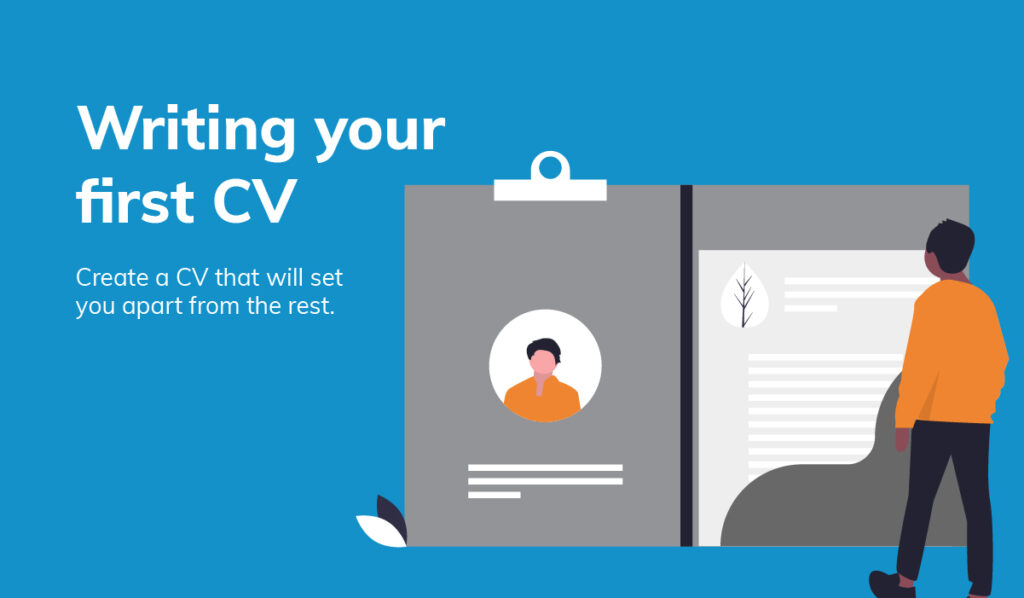Your CV is your first chance to stand out
Writing your CV is the first step in the transition from school into the working world. It’s not an easy transition. As poet E.E. Cummings said, growing up and becoming the person you always thought you could be, takes courage. I’d go a step further than that and add that it also takes time – especially for the second part. Don’t expect things to happen quickly. Many of us have gone from university to work with a spring in our step and a glint in our eye only to realise that it is a little bit harder than we may have thought; that the competition is fiercer than we imagined. So, how can we stand out?

First of all, create a CV that will set you apart from the rest. After all, when applying for a job this is the first thing that you are going to be judged on, so make sure that your first impression is one that gets you noticed. Here are some tips to help you get started.
The template
Consider the job that you are applying for. What would you like the recruiter to perceive from your CV? If it is a job in marketing for example you may want to show off your creative skills. This question will help you to decide what type of CV you would like to create. A designer who sends in a Europass CV is not going to make an impression and quite honestly is missing out on an opportunity to showcase their talent. In fact, unless specifically requested, a Europass CV is best avoided as it is commonplace and does nothing to help you stand out.
Remember that your (hopefully) future employer is going to make his mind up whether to call you for an interview or not based on your CV, and chances are that he has several to go through. So your first step is to choose the template. Do not dismiss this as unimportant – this is literally the first impact on the person who has received it. There are several websites from which you can download templates and you’re sure to find one that represents you best.
The format
Possibly the most daunting part of writing your first CV is that you have close to no work experience that can help make it look attractive. Don’t let this discourage you – focus on what you do have. Present yourself as young and eager to learn, with the right attitude. This is where format is key. Choose the format that will highlight your strengths. First-time CV writers could consider choosing to write a skills-based CV rather than a chronological one. This will focus on your skills and attributes and could give you the opportunity to better sell yourself by matching your skillset (rather than experience) to the job requirements.
The basics
Let’s start from the basic elements that every CV has: your full name and your contact details. Here you must include your phone number, email and address. You do not have to put your age if you do not wish to, although an employer will be able to give a good guess based on work experience and the dates of your education. You also do not need to include your nationality, relationship status or gender. Once the easy part is done you also need to include your Key Skills, your Education and your Work Experience, if any.
For first-time CV writers it is also a good idea, (although not necessary), to write a personal statement as an introduction after your contact details. This is where you can showcase your strengths, showing your passion and motivation to succeed in spite of not having experience. It should not be longer than a couple of sentences and should sum up who you are and what you can offer.
The content
A first CV should be one page ideally and definitely not longer than two pages, so make sure that the content you include is relevant. Choose words that pop like reliable, organised, hardworking and flexible. These are attributes that will grab the employer’s attention. Be honest of course – that’s another attribute that employers are looking for! When listing your Skills, think about what you have learnt during school. Our skills do not start developing at work. Were you captain of the football team? This could have helped to develop your leadership skills; or perhaps working on certain school projects taught you teamwork and communication. Under Education, there must be the name of the schools/university you attended, when and for how long you were there, as well as your qualifications and grades.
Finally, for Work Experience include any summer jobs you may have done, any internships, charity work or work-shadowing. This all counts as work experience. Any experience that highlights your drive and determination or any other valuable skill is definitely worth mentioning. You must include the name of the company where you worked and how long you worked there for. You should also include your title, what your responsibilities were and what you learnt from there. Focus especially on what would be relevant and interesting for this particular employer to read when writing about what you gained from this work experience.
Wherever you need to insert dates do so in reverse chronology, starting with your most recent event in each section.
Bonus tips
- Read it over and check for typos. Something as simple as a typo could result in you not being considered for your dream job and could give the impression that you lack attention to detail.
- Even if you do choose a creative template, keep it clear and professional, not overly fancy and colourful. If in doubt, stick to simple.
- Keep you email address professional.
- Be honest!
- Include extracurricular activities and hobbies – they can give insight to the employer about who you are.
Your first CV is your big step into the working world. It is an introduction to you and doesn’t focus only on what you have done, but also shows what you can do! Good luck!

